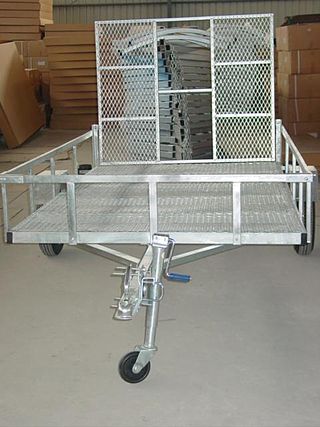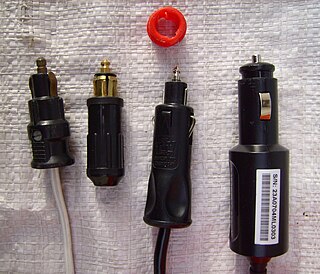
A semi-trailer truck, also known as a semi-truck, (or semi, big rig, tractor-trailer, or eighteen-wheeler) is the combination of a tractor unit and one or more semi-trailers to carry freight. A semi-trailer attaches to the tractor with a type of hitch called a fifth wheel.
A Controller Area Network is a vehicle bus standard designed to allow microcontrollers and devices to communicate with each other's applications without a host computer. It is a message-based protocol, designed originally for multiplex electrical wiring within automobiles to save on copper, but it can also be used in many other contexts. For each device, the data in a frame is transmitted serially but in such a way that if more than one device transmits at the same time, the highest priority device can continue while the others back off. Frames are received by all devices, including by the transmitting device.

A DC connector is an electrical connector for supplying direct current (DC) power.

A trailer is an unpowered vehicle towed by a powered vehicle. It is commonly used for the transport of goods and materials.

On-board diagnostics (OBD) is a term referring to a vehicle's self-diagnostic and reporting capability. OBD systems give the vehicle owner or repair technician access to the status of the various vehicle sub-systems. The amount of diagnostic information available via OBD has varied widely since its introduction in the early 1980s versions of on-board vehicle computers. Early versions of OBD would simply illuminate a malfunction indicator light (MIL) or "idiot light" if a problem was detected, but would not provide any information as to the nature of the problem. Modern OBD implementations use a standardized digital communications port to provide real-time data in addition to a standardized series of diagnostic trouble codes, or DTCs, which allow a person to rapidly identify and remedy malfunctions within the vehicle.

A tow hitch is a device attached to the chassis of a vehicle for towing, or a towbar to an aircraft nose gear. It can take the form of a tow ball to allow swiveling and articulation of a trailer, or a tow pin, or a tow hook with a trailer loop, often used for large or agricultural vehicles where slack in the pivot pin allows similar movements. Another category is the towing pintle used on military vehicles worldwide.

A hot shoe is a mounting point on the top of a camera to attach a flash unit and other compatible accessories. It takes the form of an angled metal bracket surrounding a metal contact point which completes an electrical connection between camera and accessory for standard, brand-independent flash synchronization.

Towing is coupling two or more objects together so that they may be pulled by a designated power source or sources. The towing source may be a motorized land vehicle, vessel, animal, or human, and the load being anything that can be pulled. These may be joined by a chain, rope, bar, hitch, three-point, fifth wheel, coupling, drawbar, integrated platform, or other means of keeping the objects together while in motion.

Ringfeder name is a German brand based in Krefeld founded in 1922. The brand manufactures bolt couplings, hook couplings, drawbar eyes, underrun protections and accessories. Ringfeder is part of VBG Truck Equipment, one of the divisions in the VBG Group, a large international industrial group.
Several types of connectors for car audio systems are used.

ISO 4165 is a standard adopted by the International Organization for Standardization (ISO) that describes a double-pole DC connector to supply between 12 and 24 V DC at up to 12 amps to appliances in vehicles. Although roughly similar in design to an automotive accessory receptacle, the ISO 4165 connector is shorter and smaller in diameter. It was originally a standard fitting on all the German military vehicles during World War II.

IEC 62196Plugs, socket-outlets, vehicle connectors and vehicle inlets – Conductive charging of electric vehicles is a series of international standards that define requirements and tests for plugs, socket-outlets, vehicle connectors and vehicle inlets for conductive charging of electric vehicles and is maintained by the technical subcommittee SC 23H “Plugs, Socket-outlets and Couplers for industrial and similar applications, and for Electric Vehicles” of the International Electrotechnical Commission (IEC).
ISIRI 13139 is a standard published by the Institute of Standards and Industrial Research of Iran (ISIRI) in 2011 based on Directive 2009/61/EC. It defines "Installation of lighting and light-signalling devices on wheeled agricultural and forestry tractors".
A trailer connector is a multi-pole electrical connector between a towing vehicle such as a car or truck and a trailer. It is intended primarily to supply automotive lighting on the trailer, but also provide management and supply to other consumers. It is also referred to as "trailer wire," "trailer cable," or "trailer connecting cable." Another feature the connector offers is feedback from the trailer to the towing vehicle, from being as simple as a fault indication for ABS brakes to advanced command, monitor and control using CAN bus for EBS brakes.
A number of ISO standards cover trailer connectors, the electrical connectors between vehicles and the trailers they tow that provide a means of control for the trailers. These are listed below, with notes on significant deviations from them that can cause problems.
A number of standards prevail in Europe for trailer connectors, the electrical connectors between vehicles and the trailers they tow that provide a means of control for the trailers.
A number of standards prevail in North America, or parts of it, for trailer connectors, the electrical connectors between vehicles and the trailers they tow that provide a means of control for the trailers.
An electric friction brake, often referred to as just electric brake or electric trailer brake, is a brake controlled by an electric current and can be seen on medium duty trailers like caravans/RVs and consumer-grade car trailers. It is related to the electromagnetic track brake used in railways which also use electric current to directly control the brake force.

A number of standards prevail in Australia for trailer connectors, the electrical connectors between vehicles and the trailers they tow that provide a means of control trailer lamps, and in one case, trailer brakes, and also sometimes, manufacturer-specific non-standard functions.
A number of standards specific to military organizations exist for trailer connectors, the electrical connectors between vehicles and the trailers they tow that provide a means of control for the trailers. These can be found on surplus equipment sold for civilian use.












